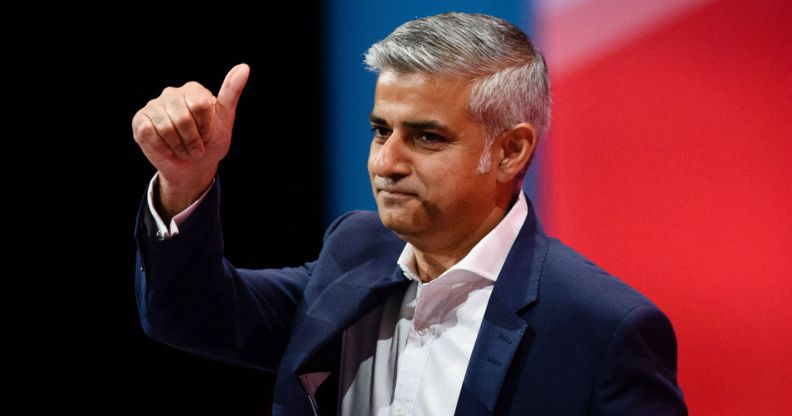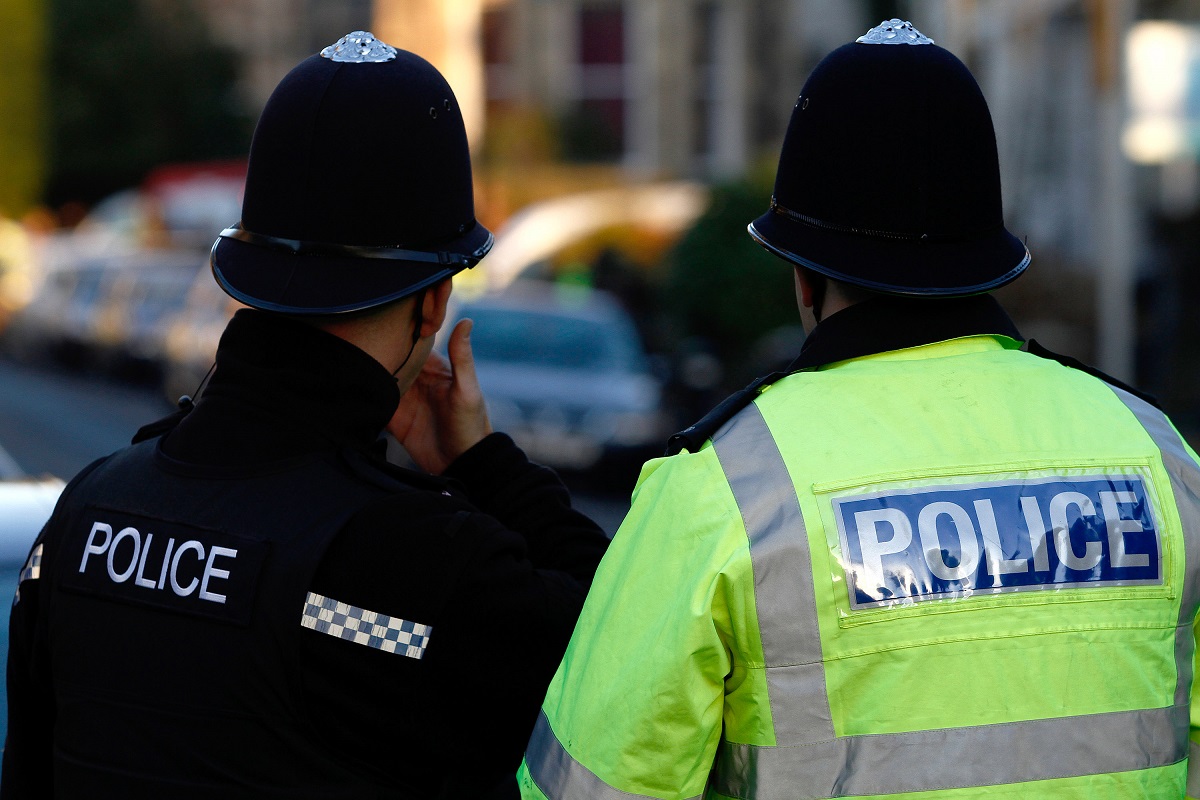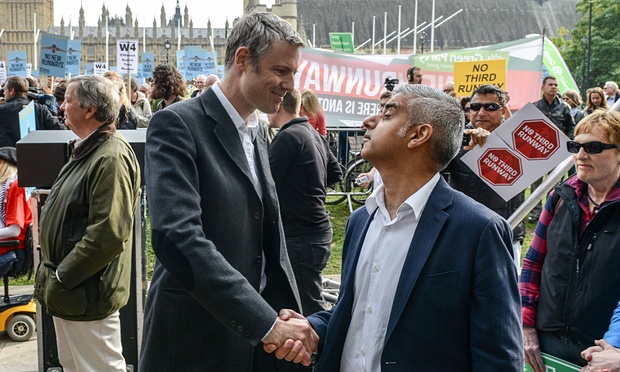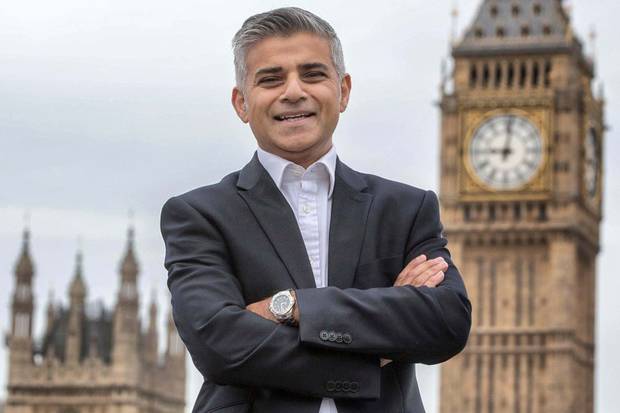Sadiq Khan: London’s record on LGBT hate crime is a ‘badge of shame’

PinkNews Exclusive
Labour mayoral frontrunner Sadiq Khan speaks to PinkNews about the issues LGBT Londoners still face – and his planned zero tolerance approach to hate crime.
In an exclusive interview, Sadiq Khan tells PinkNews why he is the candidate LGBT Londoners should vote for in the upcoming election.
You have a good track record on LGBT rights, but so have your major competitors in the race for London mayor.
Why should the LGBT community vote for you over other candidates?
Firstly, I welcome the fact that the other candidates are progressive. That’s a good thing, but you and I both know what the main challenges facing Londoners are – housing and getting a decent pay for a hard day’s work.
I have the best plans – both ambitious and realistic – to deal with the housing crisis making sure half of all new homes are genuinely affordable, not this con that Boris Johnson and Zac Goldsmith are talking about.
I am not going to patronise you and talk to you just about LGBT issues – although they matter to me, they are a priority.
But you’re a three dimensional person, so I want you to vote for me because yes I am the best candidate on LGBT issues, but also because I am the best candidate on offer to fix housing, because I can make sure if you are young, I can match your skills with employers so you have got the skills for tomorrow.

I’ll make sure if you do a hard day’s work you will get a decent pay. I’ll make sure the transport is modern and the air in London is breathable.
The point I am making is that i think that my package is not just the best for the LGBT community, but all communities.
If you want a London where you can afford to live, you can get a decent pay for a hard day’s work, you can fix the equality crisis, you can have a progressive mayor – the only way that will happen is if I am the mayor of London.
You’ve got to judge somebody by their experiences, their record, what their vision is for the city.
Recent stats show homophobic crime has gone up in London by a third and transphobic crime has risen by 25%.
Some believe this is because of the increased religious and cultural divisions in London, which have also been blamed for the growth of other hate crimes. How would you reconcile the increased cultural divide in the city?
Firstly, hate crime is personal to me. I’ve been the victim of hate crime – anybody who is a minority is potentially the victim of hate crime.
Whether you’re an ethnic minority, you’re lesbian gay, trans, religious minority, a woman, disabled, to me it’s personal because i have been on the receiving end.
My plans is a zero tolerance on hate crime, to work with the diverse communities in London to find out what the best solutions are, give people the confidence to report crime.
I was side by side with the LGBT community in May during the National Day Against Homophobia and Transphobia, where we reminded how lucky we are to live in a nice, progressive part of the world.
The philosophy I have is this: one of the great things about London, the rich tapestry of the city, the diversity is what makes it so wonderful. But actually things aren’t perfect and could be better.

Policing is another issue, as it’s so important that we don’t have any more cuts for police officers or community support officers.
Over the past five years we have lost more than 5,000 uniformed police officers in London.
Now how would you or I feel any safer walking in areas where we could potentially be attacked because of who we are if police officers are being cut – well the other guy [Goldsmith] has voted for these cuts of police officers.
All of us should be able to fulfil our potential without being discriminated against, without fearing for our personal safety.
When you speak to young Londoners who are LGBT, more than half, as a consequence of what they face, have mental health issues. more than half have self harmed or tried to kill themselves.
That’s heartbreaking, for me that’s unacceptable, so the police need to be more aware about this, we need to give Londoners the confidence to report these crimes, we have to educate young people.
I’m gonna be a mayor who has zero tolerance towards hate crime; whether it’s anti Semitism, Islamophobia or homophobic crime.
So you think focus is on community cohesion? To make Londoners get to know each other and communicate more?
Absolutely, that’s so important.
If you choose to live in one the most diverse cities in the world, you’ve got to accept people are different sexuality, different faiths, different ethnicities and different socio economic backgrounds.
That, for me, is why we are the best city in the world – but we could be better.
It’s still the case – for me it’s a badge of shame – that in spite of the progress that we have made over the last 20, 30 years if you’re a Londoner who happens to be LGBT, you make yourself vulnerable to hate crime.
It’s heartbreaking that as the father of two children, that almost half of LGBT young people have self harmed or tried to kill themselves, just think about that for a second.

One of the consequences of homophobia is that young people who have parents that don’t understand – they have to leave home.
Now if you’re getting rid of housing benefit for those aged 21 and below, don’t be surprised if that leads to homelessness, because if you can’t live at home, you can’t get housing benefit to help support you – that’s a problem.
It’s not acceptable, so we have to think about how we can make things better, that will come from leadership.
I have a role to play in leadership, I have a role to play in the relationship with the people I surround myself around with, who I talk to, where I go.
Language matters, the signals I send matter.
Following a poll conducted by PinkNews about same sex marriage following its legalisation, we found that London, on average, was very supportive of the LGBT community – apart from in the home.
13% of Londoners said they would reject their child if they knew they were gay, and 20% said they would reject their child if they were trans.
How do you intend to address the discrimination that many LGBT young people still face from their own families?
There is a great Martin Luther King saying: ‘We can legislate to change the way people act, the way they behave, but we can’t legislate to change the way they think.’
Over a period of time, by changing the way people act, it will change the way they think.
Yes things are bad, but things will improve – they are improving.
I’ll give you an example from my own life. When my parents first came to this country 40 years ago, there were literally signs in windows saying ‘no Irish, no blacks, no dogs.’

Initially, those people who had those signs up didn’t suddenly think ‘oh these Asians or these blacks are ok’, but over a period of time, by mixing with us, they realised – they’re the same as us.
The parents of LGBT people will not change their opinions overnight, but things will improve.
I am an optimist. When you go to speak to pride each year, the numbers of FTSE companies who have now got a number of members who are openly LGBT.
Examples like this will lead to attitudes changing – it won’t happen overnight but progress is being made.
So you think it’s a case of natural progression?
Yes, but we can’t be complacent – we’ve got to be the catalyst, we’ve got to use the levers we have got to improve it.
So there should be proper monitoring, public servicing it to recognise there’s an issue, get rid of prejudice, improve services.
For example is, I was raised in the 80s where there was huge awareness around HIV, but with innovation and science advancing eventually HIV is now not a life sentence.
But we’ve got to deal with the prejudices that are re-emerging stigma surrounding HIV, because the attitude towards the virus still aren’t perfect – we need to make sure that we help them get better.
The current Mayor of London hasn’t attended the city’s Pride parade since 2010. As Mayor would you vow to march in every London pride, and attend events that are thrown specifically for and in aid of the LGBT community?
That’s the easiest question you’ve asked – yes, of course I would.
I was at the Pride dinner this year, I was at the event thrown for International Day Against Homophobia and Transphobia to support.
I’m optimistic and confident that when PinkNews readers look at my background, my experiences, they will see that all of my life I have been fighting discrimination, all my life I have been fighting for equality – even when it wasn’t popular I was fighting these issues.
So the short answer is yes.
As London mayor, would you act to protect the increasing number of LGBT venues that under increasing risk of closing?
Zac Goldsmith wants to take a laissez faire approach and let the market dictate and decide what happens.
I say that we should protect the heritage of London.You should say to those developers who build luxury flats around music venues, if you want to build those flats don’t ask the music venues to noise proof their venue with insulation – you soundproof your flats.
I’ve got a London plan, which is to make sure we keep music venues, keep the night-life.

In 2007 there were 435 music venues in London, now there are 235. Why?
Because if you own a music venue you can make more money turning them into luxury flats.
I would have a policy which is advantageous to music venues – we shouldn’t have them closing down, so it comes down to who walks the walk when it comes down to an offer for Londoners.

